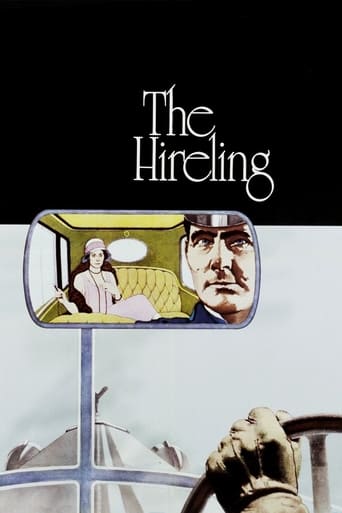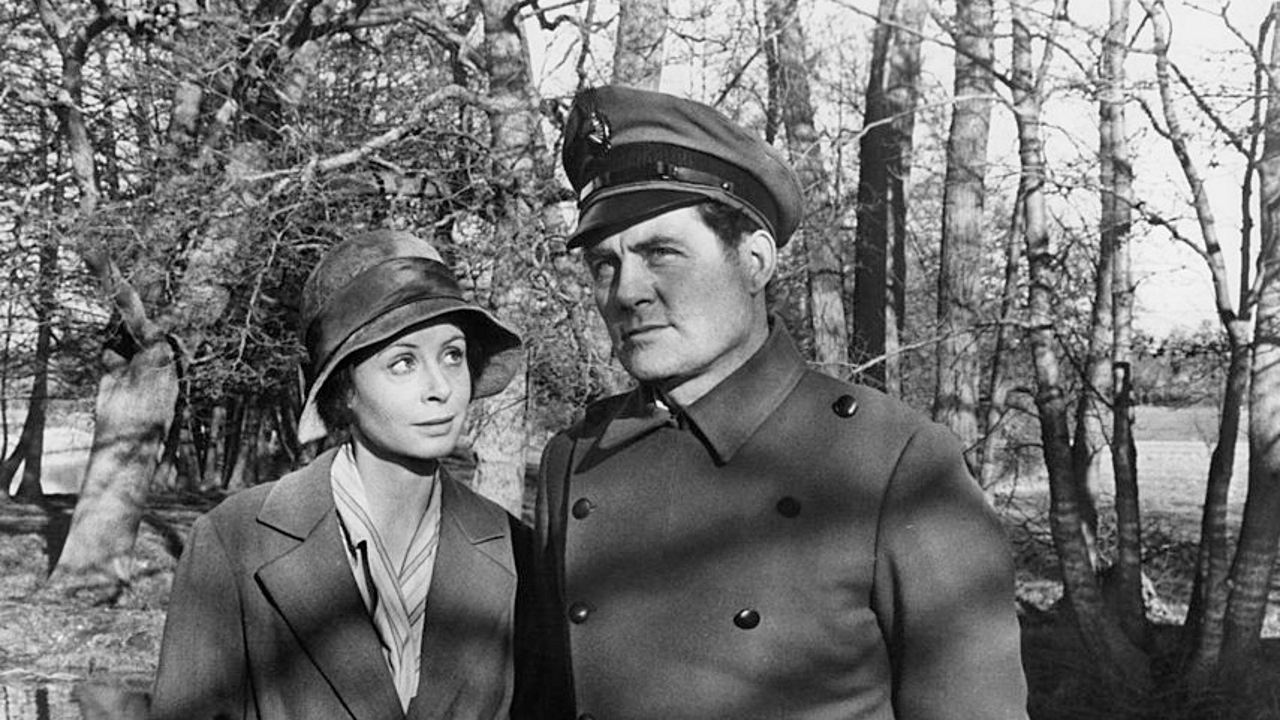lasttimeisaw
The 1973 Palme d'Or winner (a tie with SCARECROW, 1973), a British film directed by Alan Bridges and adapted from L.P. Hartley's novel, screen-scripted by Wolf Mankowitz, is quite a curio to find, stars Sarah Miles and Robert Shaw as an odd pair, the story takes place at rural England after WWI, it is an acrimonious tirade towards British hierarchical underbelly and is spiced up by the qualified performances from two leads, Miles' innate fragility and gullible naivety finds a quite befitting rhythm with Shaw's rough edge and macho dominance (also Peter Egan's nob Captain is graphically delineated with a light touch), despite the fact that the film is somewhat a lukewarm achievement. Miles is Lady Franklin, an upper-class new widow suffers from the post-trauma of her bereavement, anew from convalescence, she is mentally hurdled to resume her social life and raring to find someone who she could talk to, when she meets her new chauffeur Ledbetter (Shaw), who just initiates his own private rent business, Lady Franklin is clearly not that kind of clever woman of his tier, she befriends with him and it's not another DRIVING MISS DAISY (1989, 8/10) well-intentioned (racial) class-defying friendship crowd-pleaser, things will turn ugly as Ledbetter's escalating jealousy and infatuation towards Lady Franklin grows, which will end up with a clumsy self-destructive finale driven by indignant impulse (he doesn't have the luck and handsomeness which befits the romantic credentials in DOWNTOWN ABBEY). It is again a glum, inclement England, the lamenting dirge belts out along the first half of the film, Lady Franklin, bears a frail delicacy and her indecisive nerve of "getting the knack" to continue her life in the countryside getaway, bespeaks a damsel-in-mistress desperate for a savior (her ill-tempered, apathetic and self-centered mother, Elizabeth Sellars brings the role point-blank accuracy, for sure is more of a nuisance than a comfort here), so Ledbetter, who is professional and pretty sentient of their social disparity at first, would slowly capitulate to Lady Franklin's daring openness and closeness, and mistakes it as a kind of mutual affection (reaches to the pinnacle when he receives a helluva bunch of money from her to save his bogus financial mire), for Lady Franklin, she is much obliging to give the dole as it is a sort of compensation towards Ledbetter's optimum services and a relief to her own conscience (an upper class privilege) as well, money is her final offer, not love, of which we onlookers are all fully aware but not Ledbetter, in his eyes, it is a signal of devotion, an illusion while kindness mis-conceited as the flame of desire, especially when the benefactor is from a higher-up echelon, naturally the delusion has to be unsparingly shattered, it is the perpetual tragedy resides within the classes between "sanctimonious" upstairs and "covetous" downstairs. Like Shelton Cooper from THE BIG BANG THEORY rightfully teases "the upstairs should never eat with downstairs, it will only give them a false hope of the life they would never be involved", which I'm paraphrasing here. With all respect to the team effort, THE HIRELING doesn't ring true as a prestigious Palme d'Or champion, it is nothing but a solid period feature carries a powder peg to indict the tenacious scourge, and eventually misfired.
Chase_Witherspoon
Thoughtful study of the British class system, told from the perspective of one who essentially occupies its bowels, a chauffeur (Shaw) interacting with his employer (Miles), forming a close bond that threatens to transcend societal boundaries. Unfortunately for Shaw, his vulnerabilities mutate into misplaced fondness for Miles, a mentally crippled lady of standing whose only capable affections are for a recently returned war veteran (Egan).Slow moving, talky and ultimately (in my opinion) aimless - the climax is much anticipated, but the film ends quite abruptly and doesn't seem to me to do the narrative justice. Having not read the book, perhaps director Bridges was somewhat constrained by the manacles of the source material.Of the calibre that LP Hartley fans came to expect following "The Go Between" in 1971, "The Hireling" should appeal to anyone whose interested in the human drama, or perhaps, who admires the work of Shaw or Miles. Both are very realistic in their extremes, and of course, poignantly, in their common frailties. More narrative structure would have suited me better, even so, it's a sophisticated drama worth a look.
Tom May
Having been familiar with Hartley's "The Go-Between" for a good while, both in its original book form and in its disappointing Pinter-Losey film adaptation, this was interesting stuff. "The Hireling" proves almost a mirror image at times; set in a slightly less distant period for the main part, featuring exposure of the British Class System, and containing a set piece sports match (boxing takes the place of cricket) that reveals rather a lot about .This refreshes in its small-scale, character focus. You do not exactly get to 'know' Lady Franklin and Leadbitter in the novelistic sense, but this distance is appropriately played out in telling body language and inflection from the actors. Your distance from ever fully sympathizing with any one true character mirrors the dormant 'difference' that so dooms the central relationship. Miles and Shaw are wonderfully subtle, and we see more in their 'less'; never once are these actorly, showy performances. They are fittingly Stanislavskian interpretations that create the impression of these characters having life outsides the confines of the film. All other parts are very satisfactorily handled, though they are far smaller in this film than I presume in the novel and compared indeed to "The Go-Between", a stunning work about disillusionment. The disillusion at the centre of this film is so sadly and movingly conveyed in the late scenes where Shaw kisses Miles and is rejected, and then where a drunken Leadbitter confronts Cantrip and Lady Franklin. It's a howling shame that what would have been an incredibly poignant ending of spoiled, desolate lives at either side of the screen, is 'embellished' with a decidedly odd little coda. One is entirely bemused by the jump in tone, as Shaw's Leadbitter goes beserk and ironically sings "Rule Britannia" and "God Save the Queen" as he crashes his car into things. The political point is heavily over-egged by this bombastic, rather dingily operatic ending. All sense of subtlety, so effectively conveyed hitherto, is lost, as the implicit point is heavily and noisily made. Agit-prop surely has no place in this sort of delicate period drama.Overall, however, one cannot be too harsh. While this absurd end-piece is a major flaw, the rest of the film must be praised as a sensitive, evocative film, of sadness and detailed observation about the way British society was in the past. Hartley's languid but crystal-clear touch is very much in evidence throughout. It's just a shame that we don't end on the shattering conclusion to Shaw's drunk scene. The tragic, deluded figure of Sarah Miles' Lady Franklin is abruptly denied her place at the epicenter of the film, as the excellent human drama bizarrely slips into the realms of political point scoring. Shaw also - that most dry and yet deeply feeling of actors - is betrayed by the out-of-character excess that closes the film. Thus; a fine, small-scale triumph is sabotaged; but we ought to remember the many good points.Rating:- *** 1/2/*****
lora64
This is a thoughtful film that lays bare the inequities of the so-called upper class and those who work for them, the haves and have-nots. Robert Shaw does a creditable job in his role as the obliging, correct chauffeur, Steven Ledbetter, who helps Lady Franklin (Sarah Miles) overcome her mental depression at the outset. However, Steven has many mixed feelings regarding this lady of the upper class. He inevitably falls in love with her, which of course is overstepping the societal boundaries that separate them.I have not read anything prior to this and only judge the movie as I have seen it. I consider it a very honest story about the realities of daily living and the conflict of what we might wish or expect from life and what we get. It's a fine drama worth seeing again.



 AD
AD




